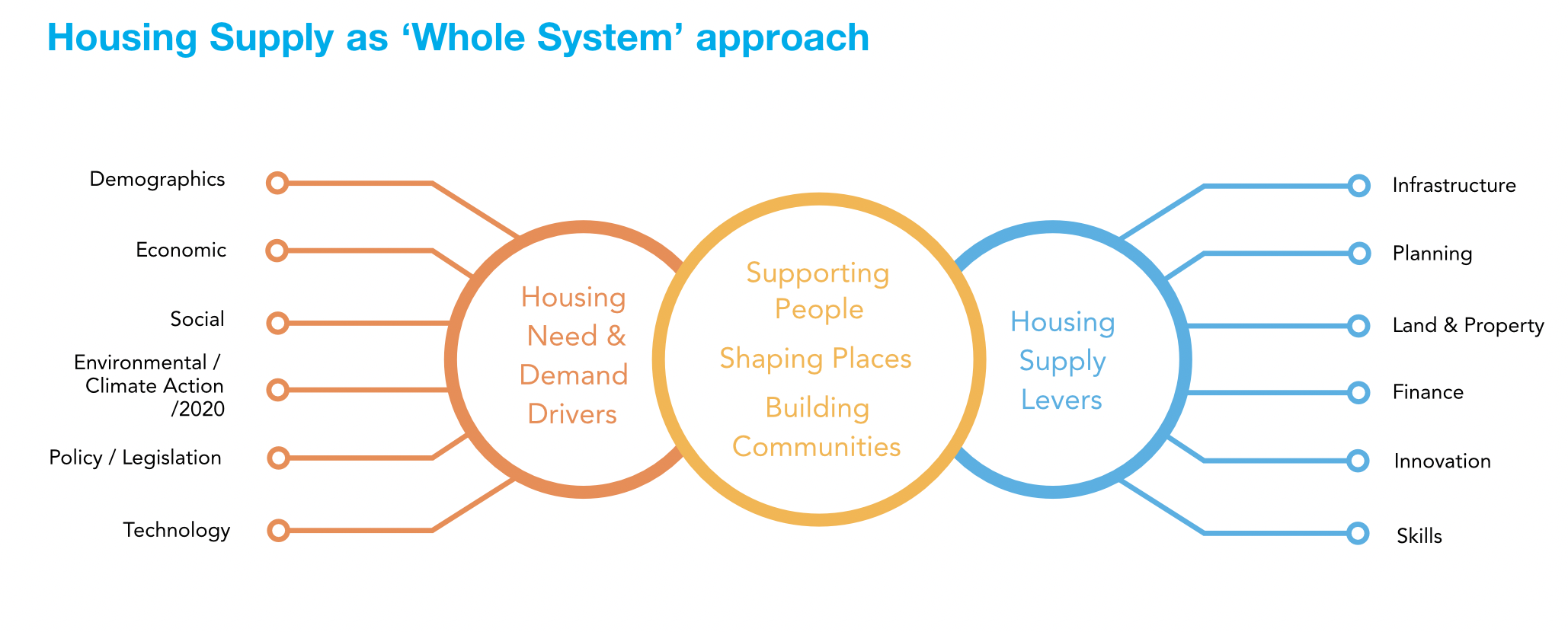Increased housing delivery and the net zero challenge

Deputy Secretary of Housing, Urban Regeneration and Local Government at the Department for Communities, Mark O’Donnell, discusses progress on the draft Housing Supply Strategy, expansion of the Social Housing Development Programme, and the challenge of net zero.
The draft Housing Supply Strategy was formed in the context of recognisable challenges in the form of increased housing stress, homelessness, and affordability challenges for both renters and potential owners. Two-and-a-half years after publication, the Strategy has still not received Executive approval and O’Donnell believes that those original challenges have become even more pronounced.
“Demand has not reduced. It seems fewer households are able to access homeownership, perhaps due to higher mortgage rates, higher property prices, economic uncertainty, or the cost-of-living crisis,” he says.
“At the same time, social housing allocations are not where we would want them to be. There is competition for homes.”
The publication of the final Housing Supply Strategy has been delayed due to the lack of a functioning Executive, and while O’Donnell says he cannot pretend there are no consequences to not having a government in place, the extensive engagement process and broad consensus on the core aspects of the strategy has provided confidence to move forward with the development of a first action plan, ensuring work towards implementation is already underway.
Early identified draft actions include providing more social and intermediate homes, including the development of a new intermediate rent product; implementation of the Social Housing Allocations review, and progression of regulations to improve the private rented sector.
O’Donnell stresses that while most of the initial actions fall under the remit of the Department, the “whole system approach” to developing the draft Strategy has helped to forge relationships with stakeholders.
“For example, we have been actively working with other departments and stakeholders to identify and progress actions that will help us deliver on major cross-cutting issues such as skills and infrastructure,” he explains.

“This includes work underway to ensure wastewater data is being effectively shared and used between relevant bodies. Also, developing actions to up-skill and re-skill our existing workforce and making the construction sector an attractive proposition for young people.”
Social housing
O’Donnell emphasises that the provision of new social homes remains a priority for his department, pointing out that despite other financial pressures, the majority of the Department’s capital budget is spent on the delivery of new social homes.
The Deputy Secretary explains that aspirations to increase new social housing targets are not only driven by the current waiting lists, but also the growing number of people seeking asylum and evacuees arriving in Northern Ireland in the past year.
“The good will of the public and the voluntary sector have mobilised impressively to meet this challenge, but it all represents strain on our capacity to provide temporary accommodation. This in turn reflects strain on our capacity to provide permanent and appropriate solutions through social housing. The strategic solution is always more social housing.”
Currently, there are two main limiting factors to delivery. The first is budget. The Department estimates the need for at least 33,000 new social homes over the next 15 years, however, recent analysis shows that if the Department was to increase starts by 50 units per year for the next five years, the cost would be well over £1 billion.

“The budget outlook at the moment is therefore pretty worrying,” states O’Donnell.
The second factor is the capacity to deliver. The Deputy Secretary stresses that the challenges of budget and capacity are interlinked, highlighting that extra funds will only be made available if decision-makers have confidence in the Department’s capacity to spend its allocation.
On plans to increase the Social Housing Development Programme (SHDP), O’Donnell says, “We have been working closely with the Housing Executive, housing associations, and a range of public bodies to identify what actions we need to take and how we might better structure delivery. Real change can only be achieved through genuine cross-departmental and appropriate government commitment to tackle housing need.”
The Deputy Secretary indicates that work is ongoing to identify public land held by government departments which could be released for social housing, while at the same time identifying the potential acquisition of existing properties, to increase social housing stock.
Discussing additional challenges in relation to wastewater infrastructure and subsequent planning restrictions, O’Donnell says the Department is working with its counterparts in the Department for Infrastructure (DfI) to find solutions and prioritise planning for housing in key areas of social housing need.
Climate change
Turning to the other significant challenge shaping the work of the Department and delivery of the Housing Supply Strategy, O’Donnell says that some of the most significant challenges for his department in relation to climate change are directly related to the residential sector.
The Department for Communities is leading the residential element of the buildings sector emission reduction targets. Currently, residential dwellings account for 14 per cent of Northern Ireland’s greenhouse gas emissions, but a step change is required if a targeted 33 per cent reduction in the residential sector is to be achieved by 2030.
Highlighting that his department has recently established a new Climate Change Division to develop policies and actions needed to reduce residential emissions, O’Donnell says that beyond the challenge of a switch away from fossil fuel-based heat systems, there is a need to massively increase the energy efficiency of homes across all residential tenures.
He adds: “We will have to do it carefully to avoid cold bridging, condensation, damp, and mould. And importantly, capacity and skills in our construction sector will need to be enhanced to deliver this.”
The Deputy Secretary believes that, although challenging, the transition to carbon neutrality presents major opportunity for the residential sector, not least the chance to make fundamental change in its ambitions, processes, and social contribution.
“The key role that both the construction of new housing and the retrofitting of existing homes will play in helping to achieve this transition cannot be understated,” he explains.
“Our social housing programme offers the opportunity to lead the way in showing how housing can meet our climate challenges. The Department intends to be proactive in driving the changes necessary to meet our commitments.”
Cost
The Housing Executive’s report on the cost of carbon savings in Northern Ireland’s housing stock indicates a mean cost of £15,600 per dwelling to improve energy efficiency to at least EER band B. With approximately 586,000 eligible dwellings, the total cost would be £9.2 billion.
O’Donnell says that a major part of the policy work will, therefore, be to consider how this transition is funded.
The Deputy Secretary concludes by saying: “We also need to consider climate adaptation for houses which means designing homes to be resilient to future changes in climate – like higher temperatures and more extreme weather causing more flooding.
“Our work on housing continues to move forward, despite the challenges and impediments that we are all facing. We will continue to look for ways to advance our housing programme in every way possible.”





